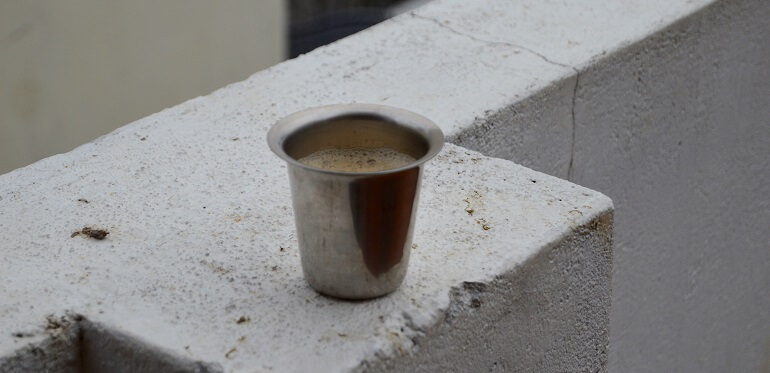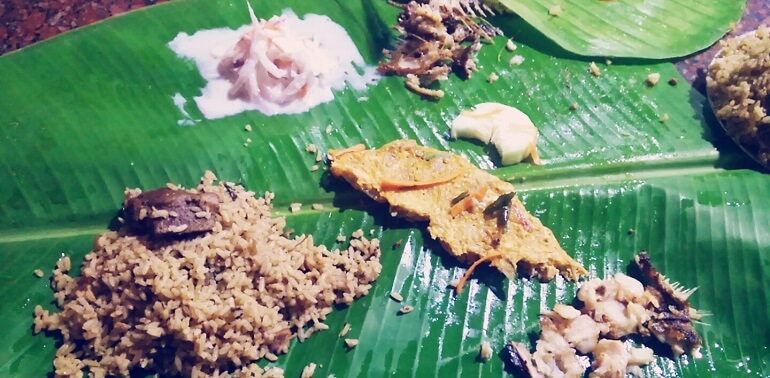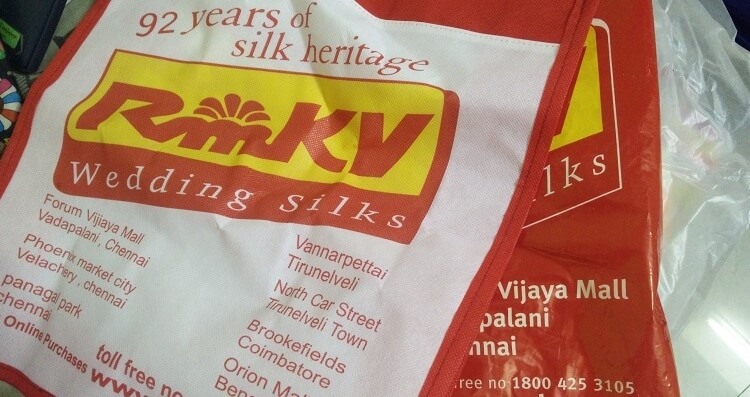Anyone who knows me knows I love to shop. Especially in India. Especially for ethnic clothes and fabric for which there is obviously a much larger selection here than in Canada. But no matter how great the outfit and/or deal I find at any major saree shop in Chennai– I always end up cringing as I receive my purchase.
It pains me to see the amount of packaging that goes into even the smallest square of fabric we buy here. Most major saree stores place every purchase into 3 layers of packaging (at no extra charge). First the items are either wrapped in paper or a thin, clear plastic and stapled shut, like a large envelope to be couriered.
Then that ‘envelope’ is placed in a thick, branded plastic bag with handles. And then, for some perplexing reason, that perfectly sturdy plastic bag is placed into a large, printed cloth material bag, usually with wooden handles.
Within my first day of shopping in India years ago, I noted this environmentally unfriendly process. I made a point to bring back some of these bags upon my next visit to a store to ask the ‘delivery counter’ to re-use them (packaging is done at a separate desk from where you are billed & make your payment; mainly because it takes an assembly line of people to layer items in this many packages).
Almost all of them refused, even if it was the same store’s bag that I had received just a few days before.

Now, after residing in Chennai for a while, I have the time to question the staff of these major saree institutions in India – Pothys, Nalli’s, RMKV, Chennai Silks, etc. – about why they engage in such wasteful packaging methods. Why do they spend the time, money, staff, and even the store real estate that is needed for these large ‘packaging sections’?
The management at almost all the stores have given me the same reply with a weak smile “Tradition, ma’am. This is how they did it back then. So we continue the same way now. That’s all.”
These answers got me questioning – given how much this country is known for trying to preserve its natural traditions and history along with modernization, is it tough to be an environmentalist in India?
My short answer would be – yes. I rarely see any separate blue bins or green bins for biodegradable waste alone, for instance. I know for a fact my hostel does not recycle; and I’ve questioned the staff about it on multiple occasions. And given the climate and that water cannot be drunk straight out of the tap, water bottles are much more common than in the West (although water coolers are placeholders in homes).
The other day I ordered 5 pieces of clothing from the same online website, and they all arrived on the same day – in 5 separate packages; the popular site does not offer the ability to consolidate the items in your order into one package. Naturally, given the sheer population size, emissions from vehicles are higher here, and, from my basic investigations, corporations are not held to and/or do not honor strict limitations/regulations in their air and chemical pollution.
But at the same time I see many everyday chores and processes done in extremely environmentally conscious ways, solely based on tradition. I have not used a dryer for my laundry in approximately 5 months. General household cleaning is usually done by hand sans chemicals or electrical aids like vacuums. One-time-use coffee cups are probably only 1/10th as prevalent as in Canada because here most people believe in taking a break from whatever they’re doing to relish their food.

Here we gather around a stall or shop, use silver tumblers or glass cups to drink some delicious filter coffee, return the serving ware and then move on; it’s sometimes the same with glass soda bottles that are sent back to companies for sanitary reuse. I have actually never seen someone sipping on a latte or some chai while travelling in a car/bus/train here (yours truly excluded).
And, if you’re not eating in, take out from most Indian eateries are usually wrapped in banana leaves, and side dishes/curries are given to you in tiny plastic bags, which are still not great, but far better than styrofoam – a material which I’ve only seen maybe 2-3 times in the past 3 months.
Similarly, food is not wasted nearly as much as I see it being back home. Sayings like “1 by 2” – a phrase that patrons can use to request their order at a restaurant be split in half for 2 people to enjoy and ensure none goes to waste – help ensure that food is not squandered, especially when poverty is rampant in both metropolitan and rural areas.
I sincerely believe those who have the means here are more appreciative of it given the constant reminders of those around us who do not. And to be fair, that packaging process I spoke about earlier does not apply to international or ‘westernized’ material goods stores that you find in the mall. Objects made from recycled materials and organic products are on the rise in popularity, possibly because its trendy to be ‘socially conscious’.

I honestly cannot tell if these are just small signs of environmental progress. And it doesn’t seem clear whether they are futile against a larger backdrop of general harm to mother earth in this country that doesn’t seem to widely enforce strict policies to ‘reduce, recycle, reuse’ or pursue strict environmental sustainability programs.
So I spoke to Albert Faria who works with the Chennai Pure Water Foundation, a decade old organization committed to providing more clean water for those in need in Tamil Nadu to learn more about conservation efforts. One interesting program they spearhead at the moment is to help improve the health of children in corporation (government funded) schools in Chennai.
It turns out that most absenteeism amongst students in corporation schools is due to water borne illnesses. So the Pure Water Foundation works with major companies to help them meet their corporate sustainability initiatives by sponsoring a technology that helps extract the moisture from the roughly 5 lakhs square km of water that is evaporated via bodies of water each day in Tamil Nadu alone. The equipment then runs the water through a filtration process that converts it to drinking water grade, which is provided to schools.
Since beginning this program the Foundation has seen a 30% improvement in absenteeism. Another program they have begun is focused on converting sewage treated water to reuse it for agricultural purposes. And although every little bit counts, Albert stressed to me that Chennai still has a very long way to go when it comes to conservation efforts.

To be honest, I never really considered myself an environmentalist before but the past few months here in Chennai have made me relish how easy we Canadians have it, in some ways, to do our part to help save the environment. Even though I’m certain there are a lot of people like Albert here in Chennai as well who would like to invoke change, it is hard to fight against century-older processes and traditions to do so.
But every little bit counts and substantial change can only be made possible by being mindful of our everyday choices—even the seemingly smallest ones. So from now on, even upon my return back home, I vow to try to:
- Continue air drying the majority of my clothes
- Relish my food/drink in one place at a time, without waste, to reduce my use of to-go packaging (or at least bring my thermos with me everywhere without fail)
- See if I can make “1 by 2” a thing back in Toronto
- Continue to bring my cloth bags to my sari shopping trips no matter how irritated I make the packing counter team

 Dilani Rabindran
Dilani Rabindran









